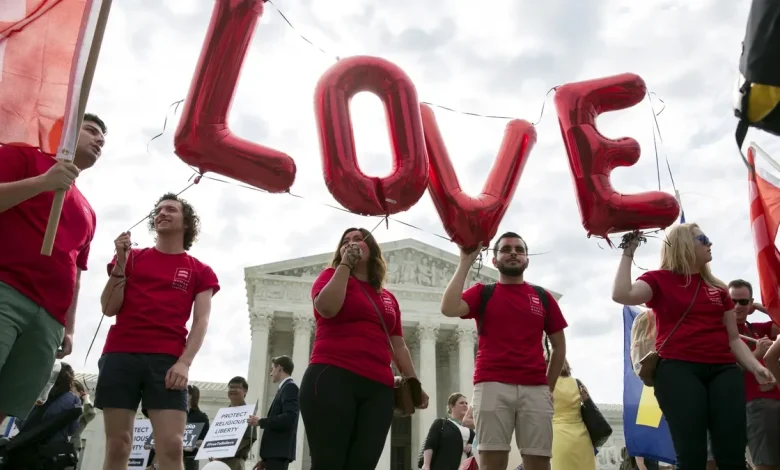Supreme Court won’t revisit landmark decision legalizing same-sex marriage nationwide

The high court rejected an appeal from Kim Davis, the former county clerk who refused to issue same-sex marriage licenses. Davis asked the court to overturn Obergefell v. Hodges.
Supreme Court considers taking case challenging same sex marriage
People gathered to protest against the Supreme Court potentially taking a case challenging same sex marriage.
WASHINGTON – The Supreme Court on Nov. 10 decided not to revisit its landmark ruling that legalized same-sex marriage nationwide, leaving undisturbed a decade old decision that some conservative justices oppose but that LGBTQ+ couples have relied on to legalize their relationships and create families.
The court rejected an appeal from Kim Davis, a former Kentucky county clerk who drew international attention when she refused to issue same-sex marriage licenses despite the 2015 decision, Obergefell v. Hodges, due to her religious beliefs.
Davis asked the court to overturn the decision as she appealed the case in which she was ordered to pay compensation to a couple after she denied them a marriage license.
Her appeal led to speculation about whether the court – which has become more conservative since it narrowly struck down same-sex marriage bans – would take another look at it.
“Today, five lawyers have ordered every state to change their definition of marriage,” Chief Justice John Roberts wrote in his 2015 dissent. “Just who do we think we are?”
When the court − which now has a 6-3 conservative majority − overturned Roe v. Wade in 2022, Justice Clarence Thomas wrote that the justices “should reconsider” past rulings about access to contraception, same-sex relationships and same-sex marriage.
They led the fight for marriage equality
Obergefell and Arthur’s fight to have their marriage recognized by Ohio ultimately led to nationwide marriage equality.
But there has not been the same kind of conservative movement to take back marriage rights for same-sex couples as there was to get rid of the constitutional right to an abortion.
There are an estimated 823,000 married same-sex couples in the U.S., more than double the number in 2015, according to the Williams Institute at the UCLA School of Law, a think tank that researches sexual orientation and gender identity issues.
“There’s good reason for the Supreme Court to deny review in this case rather than unsettle something so positive for couples, children, families, and the larger society as marriage equality,” Mary Bonauto, a senior director with LGBTQ Legal Advocates & Defenders, said when Davis filed her appeal.
Davis attracted international attention when she refused to issue marriage licenses to gay couples after the Supreme Court’s 2015 decision, landing her in jail for five days on a contempt of court charge.
When Davis was sued by David Ermold and David Moore, she argued that legal protections that provide immunity for public officials prevented the challenge. Lower courts allowed the suit to proceed and the Supreme Court in 2020 declined to intervene at that stage.
Thomas wrote at the time that while Davis’ case was a “stark reminder” of the consequences of Obergefell, it didn’t “cleanly present” questions about that decision.
After the district court ruled against Davis, she was ordered to pay $100,000 in damages to the couple and $260,000 for their attorneys’ fees and expenses.
“If ever a case deserved review,” her lawyers wrote in their unsuccessful appeal to the high court, “the first individual who was thrown in jail post-Obergefell for seeking accommodation for her religious beliefs should be it.”





